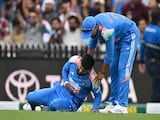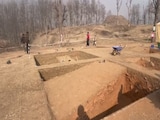Tamil Nadu Assembly on Monday passed a resolution unanimously urging the Centre to direct the Karnataka Government to release water to Tamil Nadu as per the directions of the Cauvery Water Management Authority.
Moving the resolution on behalf of the government in the State Legislative Assembly, Tamil Nadu Chief Minister MK Stalin said, "In order to protect the livelihood of the Cauvery delta farmers, who are the basis for Tamil Nadu Agriculture. This August House unanimously urges the union Government to direct the Karnataka Government to release water to Tamil Nadu as per the direction of the Cauvery Water Management Authority."
The leader of opposition in Tamil Nadu Assembly. AIADMK's Edappadi Palaniswami said that getting water from Karnataka is tough and all parties in the state will have to unite over this issue.
"Getting water from Karnataka is tough. Although we are supporting the resolution moved by Tamil Nadu Chief Minister MK Stalin on Cauvery. If we are united only we can get water from Karnataka," opposition leader said.
Adding that national parties in Karnataka had been ruling the state alternatively, he said,"We should be careful and give pressure to Centre and make sure to get our water share from them."
Questioning the DMK's stand on the Cauvery issue, EPS said," We made Parliament stand still for 22 days on Cauvery issue. But you DMK MPs did not raise this issue and put pressure on the Union Governemnt."
Replying to the opposition leader remarks, CM Stalin said, "Do I have to prove that our MPs have raised the Cauvery issue ? The Opposition leader should not just raise issue just like that without any proof."
Meanwhile, the BJP staged a walkout from the House during the proceedings.
Earlier Karnataka government had cited a severe drought in parts of its state to refuse the supply of water to Tamil Nadu. Karnataka Deputy Chief Minister DK Shivakumar on October 5 said that cumulative inflows into the reservoirs in Karnataka's Cauvery basin are decreasing. He also said that water in the reservoirs is just above half of what is needed.
Farmers in both states are protesting in the Cauvery water row. The governments of Karnataka and Tamil Nadu have been locked in a protracted tussle over the sharing of Cauvery waters. The river is seen as a major source of sustenance for the people in the two states.The Cauvery Water Regulation Committee had ordered Karnataka to ensure the release of 3,000 cusecs of Cauvery water at Biligundlu starting from September 28 till October 15, 2023.
Karnataka had filed a review petition against the order both in the Supreme Court and in CWMA (Cauvery Water Management Authority. Karnataka Chief Minister Siddaramaiah had earlier expressed his disappointment on the recommendation of the Cauvery Water Regulation Committee (CWRC) which has directed Karnataka to ensure the release of 3000 cusecs of Cauvery water at Biligundlu starting from September 28 up to October 15, 2023.
Earlier last week Tamil Nadu Chief Minister MK Stalin ordered compensation of Rs 13,500 per hectare to delta farmers who were suffering from Kuruvai (paddy) cultivation due to insufficient Cauvery water from Karnataka. Kuruvai cultivation refers to the seasonal cultivation of paddy (rice) during the Kuruvai season in Tamil Nadu.
The Centre formed the Cauvery Water Disputes Tribunal (CWDT) on June 2, 1990, to adjudicate disputes between Tamil Nadu, Kerala, Karnataka, and Puducherry with respect to their individual water-sharing capacities.
(Except for the headline, this story has not been edited by NDTV staff and is published from a syndicated feed.)















